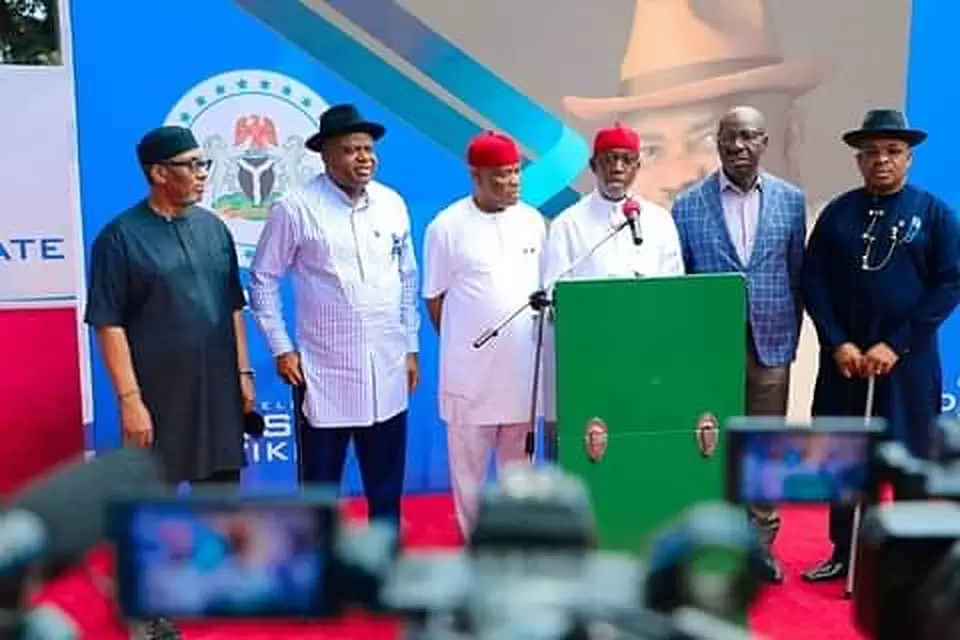Socio-Economic Rights and Accountability Project (SERAP) has given 7 Days to nine oil producing states in Nigeria to publish details of spending of N625 billion oil derivation refunds they recently received from the Federal Government.
In an open letter dated December 10, 2022 and signed by SERAP Deputy Director, Kolawole Oluwadare, SERAP also asked for locations of projects executed with the refunds.
Advertisement
Nine oil-producing states, according to the presidency, received a total of N625.43 billion 13 percent oil derivation, subsidy and SURE-P refunds from the federation account in the last two years (2021-2022).
The states that received the refunds dating from 1999 to 2021 are Abia, Akwa Ibom, Bayelsa, Delta, Edo, Rivers, Ondo, Imo and Cross River states.
A total of N477.2 billion was released to the nine states as refund of the 13 percent derivation fund on withdrawal from Excess Crude Account (ECA) without deducting derivation from 2004 to 2019, leaving an outstanding balance of N287.04 billion.
The presidency also revealed that the states got N64.8 billion in addition as refund of the 13 per cent derivation fund on deductions made by the Nigerian National Petroleum Company (NNPC) Limited without payment of derivation to oil producing states from 1999 to December.
Advertisement
A breakdown of Data obtained from the Federation Account Department, Office of the Accountant General of the Federation by the presidency, show that Abia State received N4.8 billion with outstanding sum of N2.8 billion, Akwa-Ibom received N128 billion with outstanding sum of N77 billion, Bayelsa with N92.2bn, leaving an outstanding of N55 billion.
Cross River got a refund N1.3 billion with a balance N792 million, Delta State received N110 billion, leaving a balance of N66.2 billion, Edo State received N11.3billion, with a balance of N6.8billion, Imo State, N5.5 billion, with an outstanding sum of N3.3 billion, Ondo State, N19.4 billion with an outstanding sum of N11.7bn while Rivers State was paid 103.6 billion, with an outstanding balance of N62.3 billion.
The organization stated that it is in the public interest for the nine states to publish the details of spending of the refunds, adding that Nigerians have the right to know how their states are spending the said refunds, as it is part of their legally enforceable human rights.
According to SERAP, giving details of the spending would enable Nigerians to scrutinise the spending of the refunds, adding that publishing the details of the spending of the N625 billion would also promote transparency and accountability with regards to spending of public funds.
The letter read partly: “Widely publishing details of the spending of the oil derivation refunds would ensure that persons with public responsibilities are answerable to the people for the performance of their duties in the management of public funds.
Advertisement
“We would be grateful if the recommended measures are taken within seven days of the receipt and/or publication of this letter. If we have not heard from you by then, SERAP shall take all appropriate legal actions to compel you and your state to comply with our request in the public interest.
“The public interest in obtaining the information about expenditures relating to the oil derivation refunds outweighs any privacy or other interests. The oversight afforded by public access to such details would serve as an important check on the activities of your state and help to prevent abuses of the public trust.
“SERAP also urges you to disclose details of spending of the refunds to local government councils through the state accounts, and to explain the role played by your government in the spending of public funds meant for the councils.
“The constitutional principle of democracy also provides a foundation for Nigerians’ right to know details of spending of the oil derivation refunds. Citizens’ right to know promotes openness, transparency, and accountability that is in turn crucial for the country’s democratic order.
“The effective operation of representative democracy depends on the people being able to scrutinise, discuss and contribute to government decision making, including on the spending of the oil derivation refunds.
“To do this, they need information to enable them to participate more effectively in the management of public funds by their state governments.
Advertisement
“The Freedom of Information Act, Section 39 of the Nigerian Constitution, article 9 of the African Charter on Human and Peoples’ Rights and article 19 of the International Covenant on Civil and Political Rights guarantee to everyone the right to information, including about how the oil derivation refunds are spent.
“By the combined reading of the provisions of the Constitution of Nigeria, the Freedom of Information Act 2011, and the African Charter on Human and Peoples’ Rights, applicable throughout Nigeria, there are transparency obligations imposed on your state to publish details of spending of the oil derivation refunds.
“The Nigerian Constitution, Freedom of Information Act, and the country’s anti-corruption and human rights obligations rest on the principle that citizens should have access to information regarding their government’s activities.”



